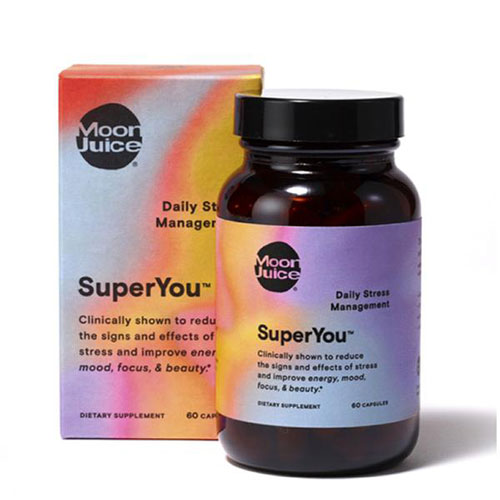This Did Make Me Feel Better
We’ve been renovating our house since last September, and it’s been stressful. Yes, I know this is a privileged, first-world “problem.” And I’m grateful that we have the means to improve our home—I'm hopeful that it will be a wonderful place to live. (So #blessed, etc.) But this doesn’t change the fact that living through construction = elevated cortisol levels. The dust. The drilling. The nonstop country music. (I like Luke Bryan, just not when I’m on deadline.)
I tried yoga. I tried wine. I tried wearing ear plugs. (And yes, I tried working at a coffee shop but quickly realized that being away from our construction project is unproductive as decisions must be made, problems solved, questions answered.) So, I stayed home…and stressed.
Thus, when I was recently researching a story for a national magazine and not one, but two doctors, whose opinions I value mentioned the stress-relieving benefits of adaptogens, my interest was piqued.
Moon Juice dusts all contain adaptogens (and promise other benefits I can't personally vouch for).
One doctor said she adds one of Moon Juice’s adaptogen dusts (flavorless powders you can mix with any liquid, pictured at right and above) to her morning coffee. Another M.D. admitted that, while the benefits of adaptogens are theoretical at this point, a lack of clinical studies doesn’t mean they don’t work.
If you read the NY Times article on GOOP recently, you understand why I am loathe to recommend something not backed by hard science. But herbal adaptogens like holy basil, ginseng, and rhodiola have been used in Chinese and Ayurvedic medicine for centuries, so there is a history of anecdotal efficacy. Just not in the Western-medicine, white-lab-coat-wearing sense.
Moon Juice SuperYou capsules have made me feel a little less edgy.
Regardless, you can choose to believe in them—or not. For me, proof was in the trying. I started popping two Moon Juice SuperYou adaptogen capsules a little over two weeks ago. For the first few days, nada. I was still waking in the middle of night with my mind racing like an Indy car, and I gnawed on my lip all day long (a bad habit that has etched a wrinkle in my chin to forever remind me of our year of construction).
But recently...something changed. Sunday night, for the first time in months, I slept without waking once. When our painters announced they wouldn’t be back to finish their job for ten days (and left ladders and dropcloths in their wake/a.k.a. our family room), I didn’t freak out. (This is progress.) And I just generally have felt less on edge, my lip is less battered, and I’m better able to focus. (Granted, a house free of painters also means no blaring music.) Maybe it’s a placebo, maybe the adaptogens are actually working. But I sincerely do feel better, calmer, and a lot less likely to speak firmly to (ok, yell at) my teenage son.
So, what do adaptogens do (in theory)? Over time, they are said to help train your body to handle stress more efficiently. As a comparison, whenever I first start training for a half marathon, the initial long runs (five+ miles) are a grind. But, after about four weeks, my heart and muscles feel stronger—and reaching eight miles feels a lot less taxing. Adaptogens, I imagine, do something similar for your adrenal gland, helping it get better at quelling extreme physiological responses to stress— and presumably, stemming excess cortisol production. This latter benefit is better for your overall health too, as cortisol is known, unaffectionately, as the aging hormone.
I’m not a doctor. I just talk to lots of them. But if you’re feeling chronically stressed like I have been, a dose of adaptogens may be worth a shot. As I mentioned, I’ve been popping SuperYou capsules with my morning latte, while my doctor friend adds Moon Juice dust to her coffee (you could also sneak into a smoothie or juice or water). And a company called Wildcrafted sells an adaptogen powder supplement very similar to the dusts.
So, how do you combat stress? Have you ever tried adaptogens? Did you read that GOOP article? Feel free to sound off in the Comments, below—or email me at mediumblondeblog@gmail.com





